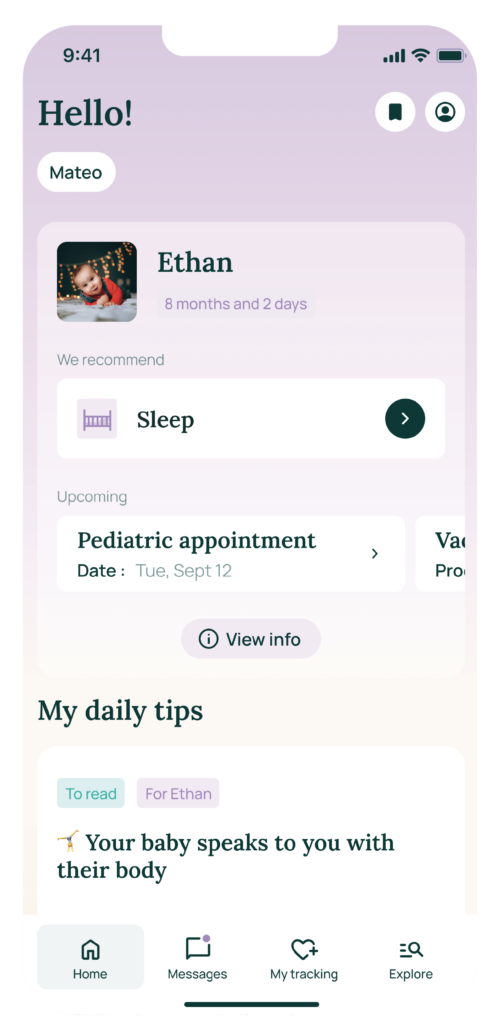
Our most viewed articles
All articles


“I Don’t Have Enough Milk!”: What’s the Solution?

Breastfeeding: what is a growth spurt?
Access more articles, tips, and Mya by downloading the May app
Try the app for free for 14 days.


5 tips for properly bottle-feeding your baby

What sleep position should you choose for your baby?

2 tips from grandma to stop breastfeeding

Encouraging Burping your baby after breastfeeding

Celebrating Halloween with a Baby: A Practical Guide for Parents

Flying with a Baby: Everything You Need to Know

Is it okay to have a baby sleep in your bed?

Letting baby cry himself to sleep: methods, benefits and limits

Breastfeeding and Baby Sleep

Should you wake a baby during sleep?

Mixed feeding: how to combine breastfeeding and bottle-feeding ?
The newborn (from 0 to 1 month)
Giving birth to a baby… What an adventure! You are now embarking on the great journey that is motherhood… and fatherhood. On your path, there will very likely be doubts and questions… What does a healthy baby look like: weight, behavior, needs? Don’t worry, May is here to support you from the very first days of your newborn.
How to know if a newborn is healthy?
Your baby is born, it’s the big leap into parenthood. And parenthood means… questions. Don’t hesitate to ask the health professionals in your maternity ward. They will reassure you.
A healthy baby is a baby whose needs are met. Whether or not you choose to breastfeed, make sure nutritional needs are covered! For full-term babies, it is recommended to offer feedings on demand (at the first signs of hunger) or to offer a bottle every 3 hours.
As a reminder, breastfeeding is a choice! Lactation generally starts within 3 days following childbirth and follows the production of colostrum, but it is possible not to stimulate milk production if you do not wish to breastfeed.
What is the normal weight of a newborn?
Full-term newborns (between 37 and 42 weeks of pregnancy) have a birth weight between 2.5 and 4.3 kg. A baby can lose up to 10% of their birth weight in the first days of life. No need to worry! This situation is very common. Your child will then gain up to 250g per week.
Note that during growth spurts, babies’ nutritional needs increase and weight gain can be significant. Your pediatrician will measure your baby’s weight during monthly visits, as well as take their height.
Premature babies (born before the 37th week of pregnancy) may have lower weight and height. Their growth rate may be slower but what matters is a good growth curve! However, if you notice growth delay, don’t hesitate to consult a health professional.
What are a newborn’s needs?
While warm inside the uterus, the amniotic fluid provided water and minerals! However, once extra-uterine life begins, your baby needs to understand that you are there to meet their needs and that they can count on you. Indeed, emotional security and meeting vital needs are essential for the infant.
If you have persistent questions or doubts, do not hesitate to consult perinatal medicine specialists!
Note that when you respond to your baby’s needs, in addition to them understanding they can rely on you, your child bonds with you! Yes, needs and emotional attachment are intrinsically linked. Nature is clever, isn’t it? This bond is very important because it impacts identity development, self-esteem, and influences future intimate and social relationships.
How to behave with a newborn?
Pregnant women have their 9 months of pregnancy to think about their little baby… Although childbirth remains the ultimate appointment, the much-awaited moment, ultrasounds are a good way to wait until THE meeting.
Now that your child is here, you probably wonder what attitude to adopt. Patience! Take the time to find your rhythm, get to know each other, and develop your maternal instinct. Don’t hesitate to confide in childcare professionals! They will guide and advise you.
Moms, dads, be kind to yourselves! At the birth of your child, you become parents and what a upheaval! If the first months of a baby’s life are crucial for their development, keep in mind that what matters most is being present, providing emotional security, and meeting vital needs.


